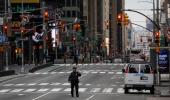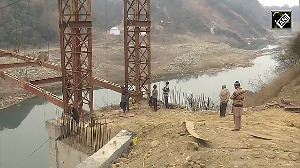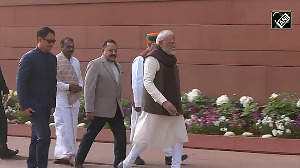The ICMR has already approved a bunch of rapid test kits for launch.
The health ministry admitted that clusters of COVID-19 had appeared in many states and the risk of further spread remains very high, reports Sohini Das.

As the number of coronavirus deaths and active cases rose sharply during the weekend, India's apex health research body issued an advisory saying containment centres across the country start conducting rapid antibody tests to detect the infection.
These tests use a blood sample and give the result within minutes.
Cases of the pandemic crossed the 3,500-mark in the country after a jump of 505 in infections in the past 24 hours, while 11 new fatalities took the death toll to 83, the Union health ministry said.
At press time the active cases stood at 4067 while 292 people were either cured or discharged, it said.
The Indian Council of Medical Research (ICMR) has already approved a bunch of rapid test kits for launch.
While some of them belong to Chinese manufacturers, others are approved by the United States and European Union authorities.
On Saturday, the Council said cases of influenza-like illness (ILI) to be monitored in health facilities and all people symptomatic of ILI to be tested using rapid antibody tests.
This may be followed by a real-time PCR (polymerase chain reaction) test using throat or nasal swabs.
The ICMR also recommended that even if the antibody test was negative, there should be a follow-up test after 10 days.
The health ministry admitted that clusters of COVID-19 had appeared in many states, including Kerala, Maharashtra, Rajasthan, Uttar Pradesh, Delhi, Punjab, Karnataka, Telangana, and the Union Territory of Ladakh.
More than 200 districts are now reporting COVID-19 cases and the risk of further spread remains very high, it said.
The government, however, assured that there was no need to panic as the rate of spread was less compared to many other countries, and that just 'one place' accounted for 30 per cent of the cases.
The ministry said the testing capacity had been ramped up significantly to over 10,000 tests per day to detect the deadly infection.
It emphasised continuous compliance to lockdown and social distancing measures, along with personal and environmental hygiene, to win this 'daily battle'.
It also released a containment plan in the case of a 'large outbreak', which included measures like geographic demarcation of the affected area, extensive contact tracing, quarantining the infected people, and enhancing capacities of COVID-19 hospitals.
On their part, municipalities have started action to arrest the spread.
The Municipal Corporation of Greater Mumbai is starting 10 COVID-19 screening clinics from this weekend in the all the containment zones and densely populated areas.
Officials said at least 1,023 confirmed cases of infection had been found to be linked to the Tablighi Jamaat congregation in the national capital last month, but massive efforts by various authorities had led to nearly 22,000 people linked to the religious grouping and their primary contacts getting quarantined.
According to officials, about 75,000 tests have been conducted so far, with the number of daily tests doubling to more than 10,000 from about 5,000 a few days ago.
While the number of government labs has increased to over 100, several private labs have also been roped in.
Globally, more than 1.1 million people have tested positive so far since the outbreak of COVID-19, which has left over 65,000 dead.
The US alone has seen over 270,000 confirmed cases, while it recorded nearly 1,500 deaths within 24 hours between Thursday and Friday.
Italy has recorded the maximum deaths at nearly 15,000.
-- with inputs from PTI












 © 2025
© 2025